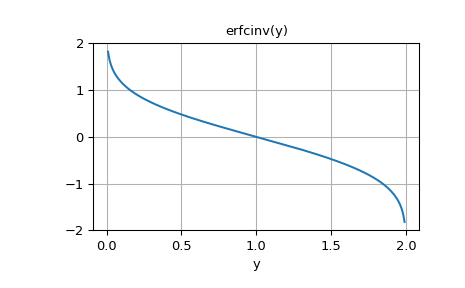scipy.special.erfcinv — SciPy v1.16.0 Manual (original) (raw)
scipy.special.erfcinv(y, out=None) = <ufunc 'erfcinv'>#
Inverse of the complementary error function.
Computes the inverse of the complementary error function.
In the complex domain, there is no unique complex number w satisfying erfc(w)=z. This indicates a true inverse function would be multivalued. When the domain restricts to the real, 0 < x < 2, there is a unique real number satisfying erfc(erfcinv(x)) = erfcinv(erfc(x)).
It is related to inverse of the error function by erfcinv(1-x) = erfinv(x)
Parameters:
yndarray
Argument at which to evaluate. Domain: [0, 2]
outndarray, optional
Optional output array for the function values
Returns:
erfcinvscalar or ndarray
The inverse of erfc of y, element-wise
See also
Error function of a complex argument
Complementary error function, 1 - erf(x)
Inverse of the error function
Examples
import numpy as np import matplotlib.pyplot as plt from scipy.special import erfcinv
erfcinv(0.5) 0.4769362762044699
y = np.linspace(0.0, 2.0, num=11) erfcinv(y) array([ inf, 0.9061938 , 0.59511608, 0.37080716, 0.17914345, -0. , -0.17914345, -0.37080716, -0.59511608, -0.9061938 , -inf])
Plot the function:
y = np.linspace(0, 2, 200) fig, ax = plt.subplots() ax.plot(y, erfcinv(y)) ax.grid(True) ax.set_xlabel('y') ax.set_title('erfcinv(y)') plt.show()
